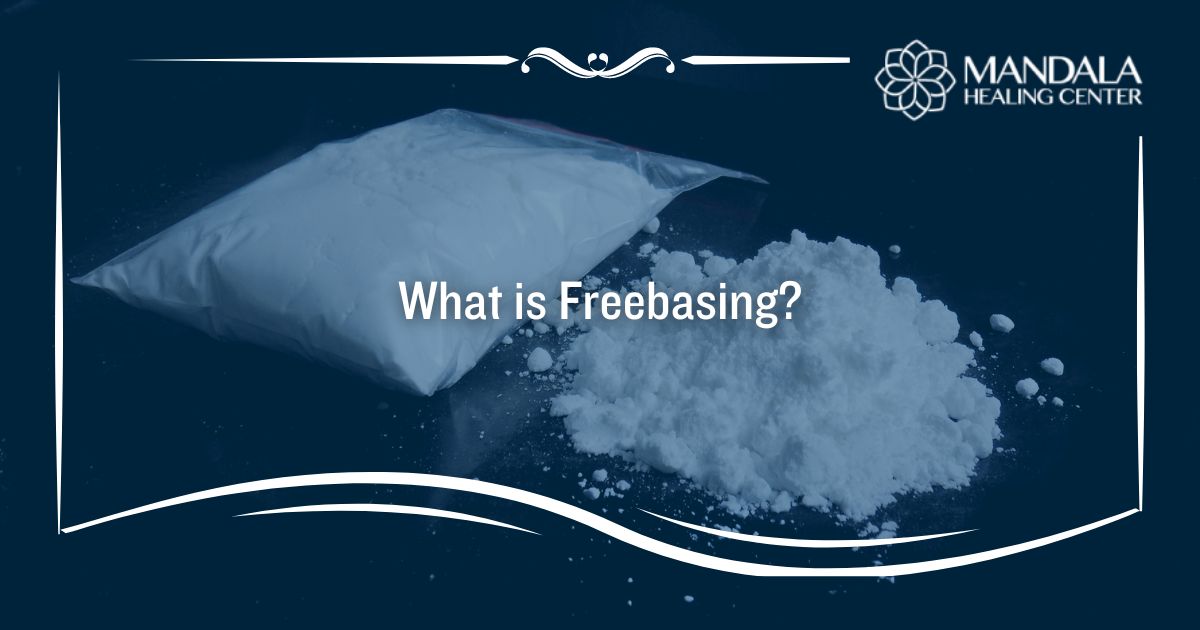Cocaine is a powerful stimulant drug that can lead to addiction rapidly. While most people who abuse cocaine snort the drug, there are plenty of ways it can be used. Any form of cocaine abuse is dangerous, addictive, and puts you at risk of serious health problems.
According to the National Institute of Drug Abuse (NIDA), nearly 5 million people abused cocaine in 2021.[1]
While snorting cocaine is the most popular method of administration, some people engage in freebasing. Freebasing is a method of using cocaine that involves heating the powder to experience more potent effects. Freebasing cocaine is highly dangerous and increases your chances of experiencing life-threatening effects like overdoses.
What is Cocaine?
Cocaine is a potent stimulant drug derived from the leaves of the coca plant, primarily found in South America. It has a long history of use among indigenous peoples, who would chew coca leaves for their stimulating effects. In its natural form, cocaine is relatively mild compared to the potent white powder known on the streets, which is not only refined and more potent but also highly addictive.
Cocaine is classified as a central nervous system stimulant, meaning it affects the brain and body by increasing alertness, energy, and focus. It achieves this by blocking the reuptake of neurotransmitters like dopamine, leading to elevated mood and intense euphoria.
How Does Freebasing Cocaine Work?
Freebasing involves heating powdered cocaine to create a highly concentrated version of the drug. This creates a more potent effect and makes it easier for individuals to use large doses. It is important to note that freebasing differs from using crack or smoking powdered cocaine.
Once the powdered cocaine is heated up and altered, it is usually placed into a glass pipe or on top of tin foil. Then, it is heated until it turns into a vapor and is inhaled. People often place a small amount of copper with the drug to speed up the heating process.
People freebase cocaine because it causes the substance to reach the bloodstream faster. Sometimes, freebasing causes more potent effects than injecting it because freebasing removes the impurities from the cocaine, resulting in an extremely powerful and fast-acting high.
What are the Dangers of Freebasing?
Freebasing is the most potent method of administration when it comes to cocaine abuse. Because of this, all of the short and long-term dangers of abusing cocaine are amplified when you abuse it in this manner. With that being said, it’s important to be aware of the dangers of freebasing cocaine.
- Insomnia
- Paranoia
- Excessive sweating
- Nausea and vomiting
- Decreased sexual functioning
- Changes in mood
- Restlessness
- Aggressive or violent behavior
- Depression and anxiety
- Cocaine-induced psychosis
In a research study published by the NIH, 98% of people who were admitted to the hospital for cocaine abuse were freebasing the substance.[2] Many of them were experiencing substance-induced psychosis, which causes delusions, hallucinations, paranoia, and unorganized thinking or speech.
In addition, freebasing cocaine poses significant health risks because you are inhaling a chemical. Using cocaine in this manner increases your risks of cancer, respiratory issues, and damage to your mouth, throat, or lungs.
Signs You Are Addicted to Freebasing Cocaine
When you are abusing a substance, it can be difficult to determine whether you are addicted to it because of the way drugs affect your central nervous system and your critical thinking skills.
If you experience the following, you are more than likely suffering from cocaine addiction:
- Being unable to moderate or quit your cocaine abuse
- Failing to meet obligations or responsibilities because of cocaine use
- Losing interest in activities you previously enjoyed because you cannot use cocaine
- Using cocaine in risky or dangerous situations, like while driving a car
- Spending a lot of time obtaining, thinking about, or using cocaine
- Needing more cocaine to experience a desired effect (building a tolerance)
- Continuing to use cocaine despite facing problems at work, school, or home
- Continuing to use cocaine even though it is causing physical or mental health problems
- Experiencing uncontrollable urges or cravings to use cocaine
- Dealing with withdrawal symptoms when you cannot use cocaine
The easiest way to tell if you are addicted to freebasing cocaine is by determining whether you experience withdrawal. If there has ever been a time when you couldn’t use cocaine and you developed symptoms like nervousness, anxiety, muscle pain, fatigue, or cravings, you are probably addicted to the substance.
Find Help for Cocaine Abuse and Addiction
If you or a loved one suffers from a cocaine addiction, it’s time to seek help. Whether you smoke, snort, inject, or freebase the substance, cocaine rehab is necessary to recover. Overcoming a cocaine addiction can be difficult, but addiction treatment centers can provide you with the tools and skills you need to achieve long-term sobriety.
At Mandala Healing Center, we offer a combination of evidence-based therapies, holistic treatments, group counseling, and relapse prevention planning. Additionally, all of our staff members are highly qualified and experienced in the addiction recovery field. These services will make the recovery process run smoothly and allow you to make important changes in your life.
To learn more about our cocaine addiction treatment program, contact Mandala Healing Center today.
References:
- The National Institute of Drug Abuse (NIDA): What is the scope of cocaine use in the United States, Retrieved September 2023 From https://nida.nih.gov/publications/research-reports/cocaine/what-scope-cocaine-use-in-united-states
- The National Library of Medicine (NLM): Characteristics of freebase cocaine psychosis, Retrieved September 2023 From https://www.ncbi.nlm.nih.gov/pmc/articles/PMC2590279/?page=1












